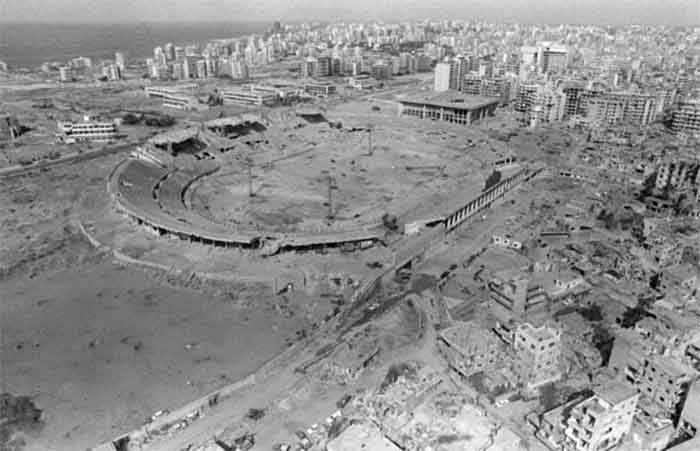
In the first testimony about the Israeli massacres that took places in the Palestinian refugee camp Burj el Shimali in south Lebanon , I
Said earlier that the Palestinian refugee camp was in ruins in every sense of the word due to the indiscriminating Israeli air raids. But despite all that, the young men of the camp rushed to the camp’s border to confront the Israeli tanks with individual weapons. Despite the massive difference in the balance of power, the youths succeeded in setting the aggressors back.
The situation was tragic in the camp on these heavy days in June 1982. The camp is only a few kilometers away from the city of Tyr. Its residents were displaced in 1948 from the villages of the Galilee region in northern Palestine, by Jewish terrorist gangs that came from the ghettos of Eastern Europe under the protection of Britain.
The League of Nations tasks Britain to supervise Palestine until it manages its affairs independently. But Britain betrayed this resolution. The majority of the camp’s residents are Sunni, Shiite Muslims, and Christians, and most of the camp’s resident’s work as agricultural workers in the neighboring fields.
Ironically, Israel called the invasion (operation Safety of the Galilee). The target was to kill the native inhabitants of Galilee uprooted in 1948 who fled to Lebanon.
In the first article I talked about the massacre of the shelter of the Hula Club. But there were other massacres inside the camp, including a massacre in a cave where the residents took refuge to hide from the Israeli planes bombing.
No journalist was covering this bombing. The Zionists are usually afraid, especially of the presence of Western journalists, because they want to commit crimes without anyone knowing. This helped them to bomb and kill without limits.
The Zionists consider the journalists’ camera an enemy because it exposes their crimes, which explains the killing of dozens of Palestinian journalists to obliterate the facts.
During these hard days, a man came to see me from the neighborhood. He told me that his wife had been killed under the rubble. And that she had around her hands some gold which eastern women usually keep as a precaution for challenging circumstances. He said that he needs the gold for his kids. And asked my help to contact the Red Cross to help him.
I apologized to him and told him that I could not go to the Red Cross since the telephone service was destroyed. And the camp is surrounded and bombarded from all directions. The man went back to his home, and two days later, he was killed while he was at home. I did not know what happened with his kids, but I heard later from someone that they were safe. The bombing did not stop all the time, especially on the fifth day of the invasion. I thought that no one would come out alive from the bombing to this extent.
I told my family to put themselves in several shelters to avoid the death of all if they all together. Meanwhile, I saw my mother for the first time. She was sitting in the corner of the shelter, and fear was evident on her face. I felt outraged and pain in my heart.
Many years have passed since all this happened. But the killing of Palestinians never stops. Israel continues murdering and stealing the land of native Palestinians .while the UN issues one resolution after the other. But all this never punishes Israel because they know that the west protects them, and all the UN resolutions are just paper.
They are right because the history of the conflict has shown that Israel has a free hand to do whatever atrocity they want knowing in advance that they escape sanctions. But despite the culture of death that Zionists brought to Palestine, they could not break the will of Palestinians.
Ps. I devote this article to Abu kasim who was the captain of our football teams when we were boys. He was killed with 12 members of his family in the Hula shelter.
Salim Nazzal is a Palestinian Norwegian researcher, lecturer playwright and poet, wrote more than 17 books such as Perspectives on thought, culture and political sociology, in thought, culture and ideology, the road to Baghdad. Palestine in heart













































